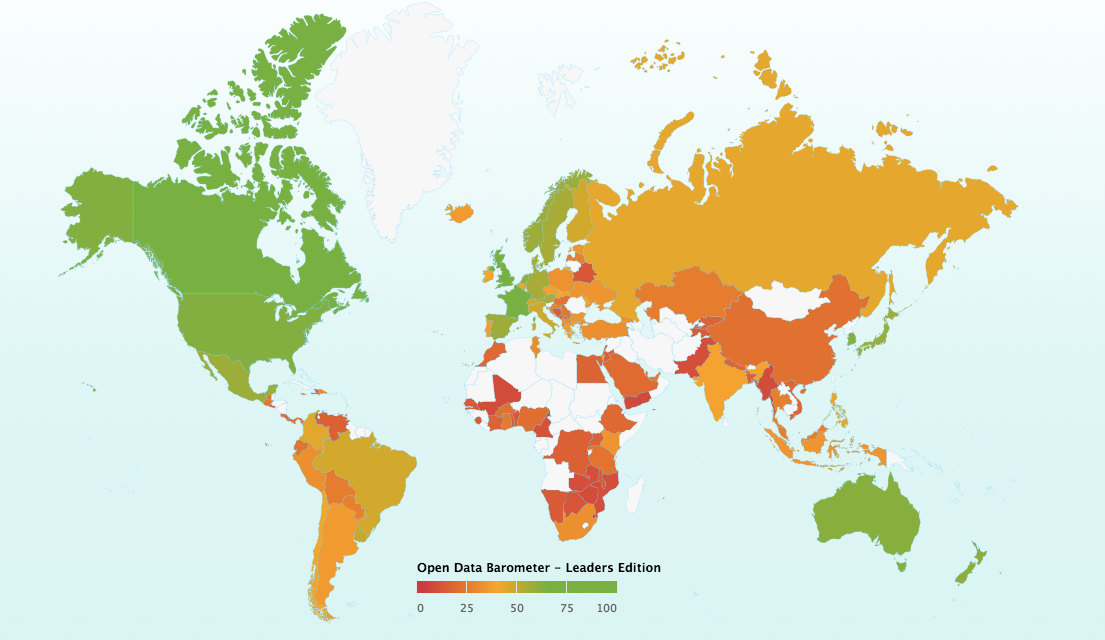Highlights:
- Ten years into the open data movement, how are governments faring?
- Should CSOs be political?
- What you should know about the tax you pay
- Donors walking the talk
- TAI spotlight: From citizen-made democracy to evolution in diversity data collection
- [New blog] Investing in governance data: what have we learned?
In case you missed it…
Ten years into the open data movement, how are governments faring?
 Photo: World Web Foundation
Photo: World Web Foundation
There is a lot of reflective conversation among open data champions in the build-up to the International Open Data Conference in Buenos Aires this week. A decade into an open data “movement”, what have we achieved? What is the future of open data? Such questions abound in side meetings. Offering some meat to those conversations, the World Wide Web Foundation has released the latest Open Data Barometer measuring publication and use of open data for accountability, innovation, and social impact. Although the coverage is reduced to 30 countries, findings indicate stronger evidence of impact but still a persistent worry that governments still treat open data as a side project. Recommendations such as putting “open by default” into action, building and consolidating open data infrastructure, and publishing data with purpose will no doubt feature in discussions over the course of the week.
For our part, stay tuned for TAI’s forthcoming report on what makes for a savvy governance data investment. Liz Dodds kicks things off with a blog on lessons learned from governance data initiatives to date [link also in the TAI spotlight below]. Look for her guiding questions to come later in the week.
The US may have slipped in the Barometer rankings but is still home to exciting data governance experimentation and regulation. For example, a new law in Florida sets a new gold standard for collecting criminal justice data for greater transparency and accountabilityaccording to Laurie Garduque of MacArthur Foundation (TAI member). More data allowed communities to examine trends over time and identify and eliminate ineffective, inefficient and unfair practices. Further, it assisted jurisdictions to pursue programs and policies that protect public safety and responsibly steward taxpayer dollars. At the federal level, Jane Wiseman reflects on the roles played by Chief Data Officers in agencies – a model for other governments to follow?
Of course, citizens have their part to play in leading to good data outcomes, and it’s interesting to see Havard Business Review lead this month with a dive into the ease with which we offer uninformed consent to personal data use. Are you one of the vast majorities skipping the inconvenience of simple steps early on which could protect your data down the road?
Should CSOs be political?
Our past Weekly featured Tanzania’s steps to make itself the sole custodian of governance data and criminalize disclosures. Yet one more contributor to worsening relationships between civil society and the government in much of the continent including Uganda where the president has blamed civil society organizations, foreign interference, and the media for recent protests and the EU is having to defend itself from accusations of funding youth to overthrow the government. In Kenya, CSOs have raised concern over “worrying” state of public participation in governance and decision making in one of the counties. How to respond? Fredrick Kawooya urges CSOs to be political but not partisan and focus on restraining abuse and misuse of power by political leaders.
To put the state of CSOs into perspective, Duncan Green flags Institute of Development Studies’ new literature review on civic space – a helpful overview for those newer to the issues – and offers his own research questions to explore on top of the IDS teams’. What would you add? And in case you get too depressed, read Almut Rochowanski’s update on Russia where despite fears the “foreign agent law” would spell doom on freedom of association in Russia, parallel universes of Russian civil society are flourishing.
What you should know about the tax you pay
Farah Nguegan argues tax illiteracy is exacerbating a host of ills, including enabling tax evasion. This illiteracy might also be a contributor to a “pink tax” effect, where women are unfairly paying more for some things than men (read a more comprehensive take on the pink tax here).
Research conducted by Elisa Casi, Christoph Spengel, and Barbara Stage shows the U.S. as the only major economy in the world, which did not commit to the Common Reporting Standards by Automatic Exchange of Information (AEOI). The country seems to emerge as a potentially attractive location for cross-border tax evasion.
In our corruption roundup, read why donors are freezing aid to Zambia, the African Union Advisory Board on Corruption pledges to “always be open” to civil society, Transparency International outlines 10 key areas where increased disclosure and public commitments could reduce the opportunity for corruption in the defence industry, and Rwanda explains how its electronic government procurement system has contributed to reducing fraud and corruption as there is no personal contact with bidders.
Essential Viewing
The Tax Justice Network’s film “The Spider’s Web” explores the UK’s network of tax havens and the role of the City of London.
Donors walking the talk
In an effort to make philanthropy “more strategic, responsive and transparent,” Philanthropy Australia and US-based Foundation Center have launched an online platform they claim will provide “unprecedented insight” into the distribution of philanthropic funding in the country, allowing users to see funding trends, identify who else is funding in their areas of interest, and discover potential new partners for collaboration. Interesting to hear Arab philanthropists also recognize that they’re giving to become more transparent and accountable. They might want to also talk to Robert J. Reid, whose research looks at ways to get past the funder-grantee power imbalance and foster a more genuine partnership approach – requiring shifts by funder and grantee alike. If done well, it can help non-profits reach their potential.
Long read of the week

Government Digital: The quest to regain public trust by Alex Benay
TAI spotlight
The latest from our members from citizen-made democracy to evolution in diversity data collection
Citizen-made Media Strengthens Democracy | MacArthur Foundation
Jennifer Humke explains how bottom-up, citizen-made media strengthens democracy
How Tech is Fueling Grassroots Organizing in Indonesia | Ford Foundation
Steve Rhee explores how indigenous groups harness public interest technologies to fight for their rights
Evolution of Diversity Data Collection |Ford Foundation
Megan Morrison and Chris Cardona talk about Ford Foundation’s new grantmaking system, Fluxx, and how it made them rethink their diversity questions
Read our Latest Blog

Are you investing in governance data? Find our top five lessons learned from reviewing evidence on the outcomes of governance data initiatives to date.

We’re looking for the next member of our team in Washington DC. We’re biased, but we think it’s a great job! Apply by this Sunday, September 30. Details for the Program Associate position are on our website.
Calls: Proposals, papers, speakers and course invites
- Congressional Oversight Fellowships – September 27
- Engine Room Matchbox Partnership Applications – September 28
- Money Trail Grants – July 15, September 30, November 15
- Reagan-Fascell Democracy Fellowship– October 15
- Fellowships for Investigative Journalism Conference – October 29 – 31
On the calendar
- Accountable Now webinar series – September 1 – November 30
- Open Data Standards Day – September 26 (Buenos Aires, Argentina)
- Feedback Summit 2018 – October 4-5 (Washington, DC, USA)
- Funding for Development Conference – October 8 (London, UK)
- Code for All Global Summit – October 8-12 (Bucharest, Romania)
- National Tax Conference – November 12-13 (Washington, DC)
- Ethical tech Summit – October 20 (Manhattan, New York)
- Civic Tech: India 2018 – August- November (Bangalore, Delhi and/or Mumbai, India)
- The Future is Open: 5th International Open Data Conference – September 27-28 (Buenos Aires, Argentina)
- European Evaluation Society – Evaluation for More Resilient Societies– October 1-5 (Thessaloniki, Greece)
- Accountable Now Annual Workshop 2018 – October 10- 12 (Berlin, Germany)
- 18th International Anti-Corruption Conference – October 22-24 (Copenhagen, Denmark)
- UN World Data Forum – October 22-24 (Dubai, UAE)
- BigSurv18 – October 25-27 (Barcelona, Spain)
- Public Sector Economics 2018 Conference – Fiscal Openness: Transparency, Participation and Accountability in Fiscal Policies – October 26 (Zagreb, Croatia)
- AEA Evaluation 2018: Speaking Truth to Power – October 29 – November 3, 2018 (Cleveland, OH USA)
- Global Partnership Forum – October 30 – November 1 (Washington, DC)
- OGP Asia-Pacific Regional Meeting – November 5-6 (Seoul, Korea)
- Canadian Open Data Summit – November 7-9 (Ontario, Canada)
- Data4Good Conference – November 14 (Birmingham, UK)
- ODI Summit – Data | Value – November 20 (London, UK)
- Outcome-Oriented Monitoring, Evaluation & Learning – December 3-5 (Nairobi, Kenya)
- Open Data Day – March 2, 2019
- CSV, conf, v4 – May 8-9, Eliot Centre, Portland
- Collective Impact Forum Convening – May 14-16, 2019 (Chicago, USA)
- Global Conference on Transparency Research – June 26 – 27, 2019 (Rio de Janeiro, Brazil)
